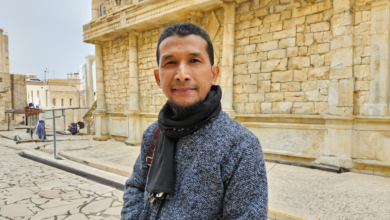
The biggest messages from the commemoration of the Eid al-Qurban series that we are celebrating today, of course, are not just commemorating the historical humanitarian events of the Prophet Ibrahim's family. But more than that, to raise enthusiasm and awareness in our souls, we must be ready to sacrifice for the happiness of ourselves and for others. We must be ready to meet the success and improvement of life with struggles and sacrifices.
There are at least four main messages that we can learn from the sacrifice and the extent to which we are able to implement them in our daily lives.
First; The main message of sacrificial worship is the value of monotheism. The element of monotheism from the aspect of the sacrificial worship performed by Prophet Ibrahim by means of sacrificing Ismail has taught us to be true monotheism.
Prophet Ibrahim and his family were able to free themselves from material servitude, in this case the child he loved, towards servitude only to Allah. Through this message of sacrifice they are able to show their faith, submission and obedience only to Allah, the Owner of the Universe..
Prophet Ibrahim had succeeded in breaking away from his attachment to the world, whether it was body, soul, heart or spirit. Because, stickiness to the world will be a barrier for someone to make sacrifices, obedience and obedience in carrying out Allah's commands.
Prophet Ibrahim's submission to Allah is seen in the chanting of his prayer:
انِّيْ وَجَّهْتُ وَجْهِيَ لِلَّذِيْ فَطَرَ السَّموتِ وَالْاَرْضَ حَنِيْفًا وَمَا أَنَا مِنَ الْمُشْرِكِيْن. قُلْ إِنَّ صَلَاتِيْ وَنُسُكِيْ وَمَحْيَايَ وَمَمَاتِيْ لِلّهِ رَبِّ الْعَلَمِيْنَ. لَاشَرِيْكَ لَهُ وَبِذلِكَ أُمِرْتُ وَأَنَا أَوَّلُ الْمُسْلِمِيْن
"I set my face, to the one who made the heavens and the earth, I tend to surrender again to Allah and I am not of the class of people who associate God. Indeed, my prayer, my worship, my life and my death I leave only to Allah, God, the excitement of all nature. Occasionally I do not associate Him. And thus I was assigned, and I am from the Muslim group (Islam) ".
The value of monotheism in the story of sacrifice is that the sacrifice made by Prophet Ibrahim was intended only for Allah alone, not for Him. The story of the sacrifice emphasizes the denial and prohibition of performing sacrificial services for worship other than Allah, such as making a sacrifice intended for something so as not to be hit by a disaster, or performing a qurban intended for something that will benefit. In fact, it is Allah alone who can bring about disasters and bring benefits.
Second; Sacrificial worship carries a message of spirituality. The qurban worship is one of the instruments or means of proof: the extent of one's faith in Allah SWT. The form of a person's sense of faith also includes sincerity. That is, it must be done purely in hopes of Allah's approval and in carrying out His commands.
As Allah says in the Quran surah Al Kautsar verses 1-3:
إِنَّا أَعْطَيْنكَ الْكَوْثَرَ. فَصَلِّ لِرَبِّكَ وَانْحَرْ. إِنَّ شَانِئَكَ هُوَ الْأَبْتَرُ.
"Indeed, We have given you many favors. So establish prayers for your Lord; and sacrifice. Indeed it is he who hates you who is cut off.
Sacrifice is not because of shame to society if we do not sacrifice, because we are capable people, or because people are capable of wanting to be seen as people who are diligent in performing worship, or are intended for image purposes only. If such a sacrifice will never be accepted by Allah SWT and its worship can be said to have no spiritual element in it. Even worship like that will get sin from what has been done.
Therefore, when performing a sacrifice, sincerity is required that grows from the bottom of the heart, so that it is accepted by Allah SWT as righteous deeds. Sacrifice is expected to foster and hone a sense of sincerity in religion.
A sense of faith also includes obedience. In the meaning of the word, sacrificial services must be carried out on the basis of obedience to Allah's commands and not on obedience to other than Him. By sacrificing, it can increase obedience to Allah in all forms of obedience, both in carrying out God's commands, as well as obedience in staying away from all His prohibitions. Either in solitude, or in a crowd, in a difficult or happy atmosphere.
Even the most important part of the sense of faith is the spirit of sacrifice that is reflected in the material form that we offer, namely livestock, with which we have spent our beloved treasures in order to carry out Allah's orders. The ritual of sacrifice has trained us to always be ready to sacrifice, just as Prophet Ibrahim (as) was willing to sacrifice his beloved child, in order to carry out Allah's orders.
Third; Through sacrificial worship, it has ordered humans to have social sensitivity. In the sacrificial service there are also social values, because every worship that Allah shari'ah for His servants contains social values.
This is because Islam is a religion that cannot be separated from social life. So, many of us find both in the Koran and the hadith that contain socio-human values, such as the implementation of sacrifices, supporting orphans, and feeding the poor.
Therefore, the main purpose of performing the sacrifice is not only worship to gain the reward of the hereafter, but also aims for the benefit of mankind in the world. Namely, sharing among social creatures. Maybe, we can enjoy the delicious meat of mutton, beef and buffalo every day. However, it is not certain for our other voices, because of economic limitations. During the moment of Eid al-Qurban, they may be entertained by enjoying the sacrificial meat that we distribute to them.
Fourth; The sacrificial service also contains a moral message which is indicated by the symbols in the sacrificial ritual. History records that the implementation of the sacrifice of Prophet Ibrahim (as) is a historical message that is full of sacrificial values.
Try to imagine, when the Prophet Ibrahim was ordered by Allah to sacrifice his son Ismail. he is overshadowed by the loss of a generation that is none other than his own flesh and blood. A wise man once said, "Children are more valuable than possessions: it is better to lose property than to lose children". Moreover, if the child is a child who is loved and always looks forward to his presence to continue his descent, just like Ismail, who was prepared as the crown prince to continue the struggle of Prophet Ibrahim (as). Prophet Abraham's submission and willingness to sacrifice his beloved son automatically indicated his willingness to sacrifice everything he had simply because he wanted to gain the pleasure of his Lord.
It is not an exaggeration to think that the attitude of being willing to sacrifice in the implementation of the sacrificial ritual carries a very important meaning. It is a form of moral attitude which, when applied by various levels of society, can be a solution to various problems in human life today. The desire of the rich who are willing to sacrifice with their wealth to help the poor will certainly provide solutions for efforts to alleviate poverty and eradicate the gap between the well-off and the less fortunate. So, will grow the character of mutual love between fellow servants of God.
The moral message for a leader who is willing to sacrifice is shown through his policies which contain benefits for the whole society. Not only the benefit of certain individuals and groups. The most important thing for those who perform sacrificial worship: must cultivate a self-sacrificing attitude both their property, soul, energy and mind to carry out what Allah commanded, as was done by Prophet Abraham.
The moral message of animal sacrifice is that animals are a symbol of the ugliness that exists in humans. The vices that exist in oneself are always identified with the bestial qualities that humans must discard.
Allah in several verses of the Koran compares something bad that is in humans to animals, even more astray than livestock. Through the moral message of sacrificial worship, likening the animal nature and character that has no rules, which justifies any means to satisfy his desires, even though he has to torment others, must be eliminated from within humans.
Was it not when Prophet Ibrahim (as) was going to slaughter Ishmael, then Allah replaced him with a kibas containing a lesson so that we respect human life? Also, has the meaning of human liberation from human abuse over other humans? When Allah replaced Ishmael with a kibas, there was a message which implied that humans would no longer trample human dignity, and dignity.*
* From Ustadz Zulfirman's Eid al-Adha sermon in Central Edinburgh, Central, Hong Kong which was held together with DDHK-GAMMI.
Also Read:
Eid al-Adha sermon: Momentum to Increase Obedience to Allah Ta'ala
Eid al-Adha sermon: 4 lessons from the story of the Prophet Abraham and his family
Eid al-Adha sermon: Momentum to Realize Faith and Sincerity to Worship with Sacrifice



